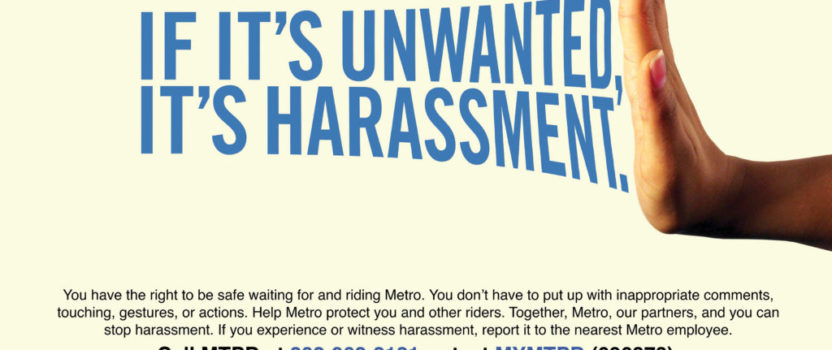Introducing Our New Anti-Harassment PSAs with WMATA
Have you ridden the metro in the past week? Then you’ve probably seen our new anti-harassment PSAs with the Washington Metropolitan Area Transit Authority’s (WMATA)!
The PSAs are part of WMATA’s anti-harassment campaign, which was sparked by CASS’s advocacy efforts in 2012. The first round of anti-harassment PSAs were released in April 2012. In conceptualizing the new round of PSAs, it was important to CASS and our partner, Stop Street Harassment, that the PSAs not address only women, but also LGBT people, populations that research shows disproportionately face sexual harassment. The ads show hands representing different races and genders to illustrate that harassment is not exclusive to any one group or sex.
We want anyone who experiences harassment — male or female, gay or straight – to know that they can take action and have a right to feel safe.
At CASS, we also believe the onus to prevent sexual harassment and assault should always be on the perpetrator, rather than the victim. In stating, “If it’s unwanted, it’s harassment,” the new PSAs can be read to address both perpetrators and victims alike, rather than victims alone.
Ending sexual violence requires creating culture change, and WMATA’s anti-harassment campaign is helping do just that.
It all began in 2012, when a study of our blog submissions on public sexual harassment and assault in DC found that 30 percent of all incidences reported to us took place on DC’s public transit system, including regular reports of groping, indecent exposure and public masturbation. Yet at the time, WMATA had no policies in place to address sexual harassment and assault.
So, we testified before DC Council about the need to prevent sexual harassment and assault on metro! With the help of experts, survivor testimony and friends like Stop Street Harassment, we suggested WMATA implement a three-pronged approach to addressing and preventing sexual harassment on Metro: 1) A public awareness campaign; 2) An online portal for individuals to report incidents to Metro Transit Police, along with improved data tracking of incidents; and 3) An all-staff training of WMATA’s 3,000 frontline staff on sexual harassment and assault response.
The online reporting system helps track trends to reduce the problem, and the all-staff training is integral to supporting victims and creating a quick response to the problem. The PSAs play a critical role in helping spread the message that sexual harassment is unacceptable.
Three years after CASS first reached out to WMATA around the issue, the transit agency’s anti-sexual harassment campaign has become an international model.
Since 2012, CASS has consulted with advocates working on transit agencies in New York, Chicago, London and Canada. Here in DC, we couldn’t be more proud of WMATA for leading the way in helping make public transit safe for all.

